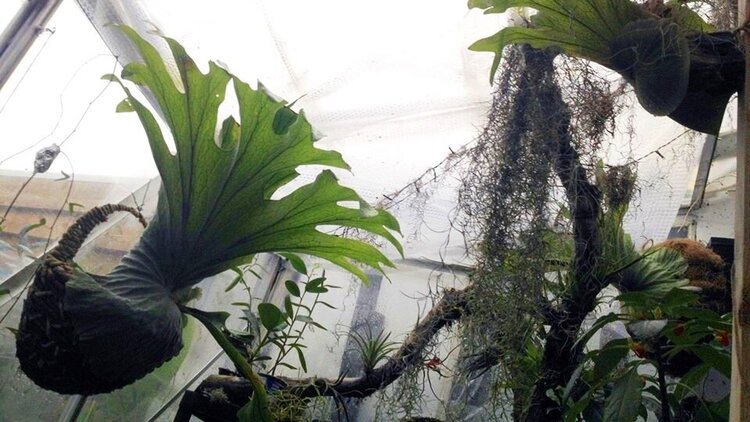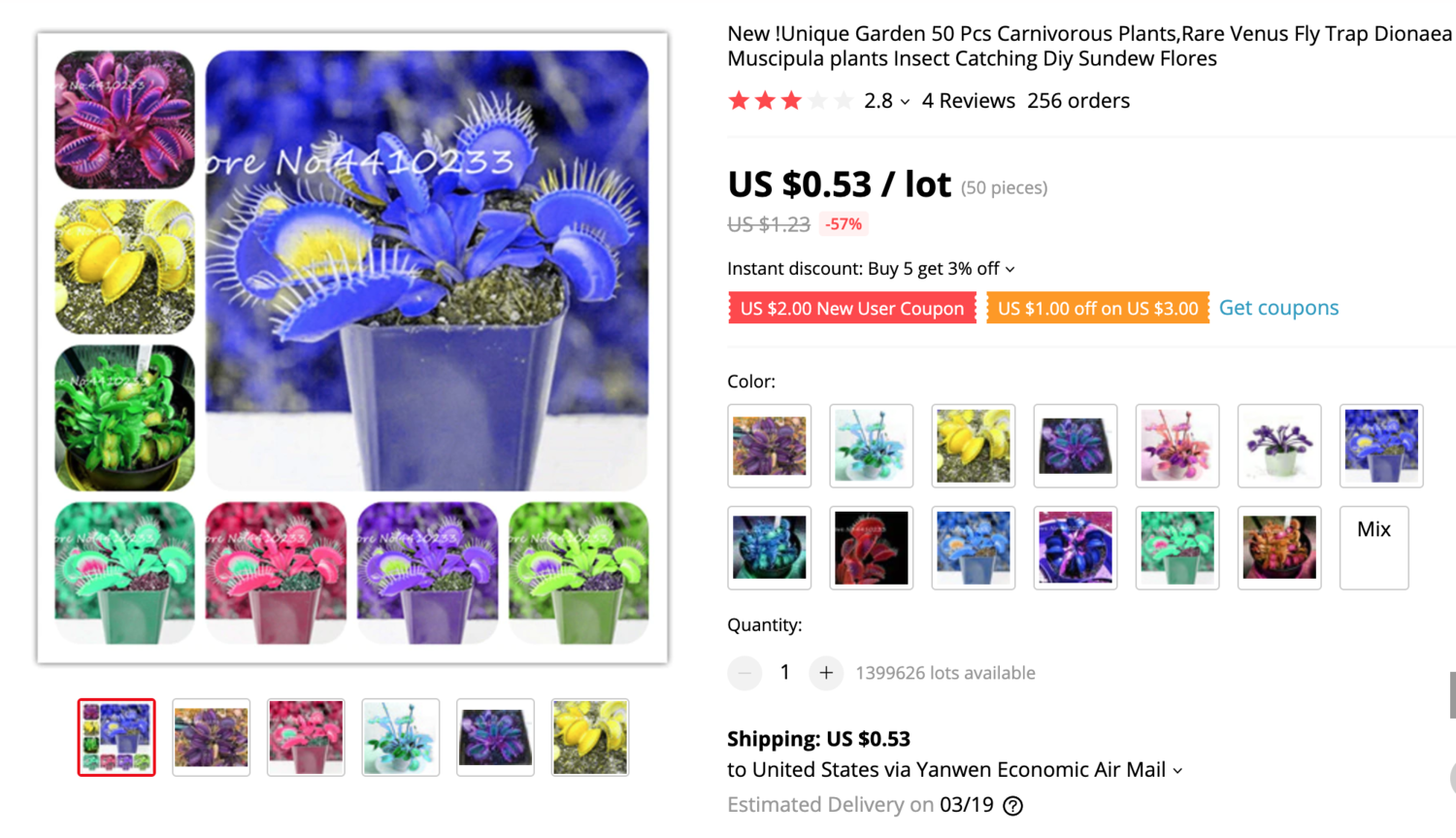
Avoiding Online Seed Scams
Don’t fall for this.
With the internet, obtaining hard-to-find plants has never been easier. Or has it? Even a casual glance at the offerings on Ebay present the prospective purchaser with an unbelievable array of impossibly-diverse offerings… literally. Far too frequently these auctions are fantastic by definition – meaning the plants they’re purporting to offer exist only in fantasy.
It seems more common to encounter scam listings for seeds than for plants – with seeds, it’s harder for the average person to identify whether the seeds sent are the same as the seller has claimed. By the time they germinate (if they germinate), it might be too late to report the listing and get a refund. It’s not uncommon for these scam listings to outrightly state it might take longer for the seeds to sprout than the time you are allowed to file a claim against a seller.
This is not a kiwi colour.
This one appears to show genuine tomato seeds, but there is no question this image of the tomatoes is modified.
If what you’re seeing in the photo surprises, shocks, impresses, or amazes you, that’s a warning sign. If you’ve never before seen blue strawberries, there’s a reason for that – no plant is capable of growing them. The photos themselves are perhaps the best indicator of a scam listing; the more unbelievable the photo looks, the less you should believe it. Here are some specifics –
Unlikely Colour –
Blue strawberries, lilac tomatoes, rainbow roses… if you weren’t already aware I’m sorry to be the one to have to inform you of this, but these do not exist without the use of software, paint, or dyes.
Photoshopped Tomatoes.
Eucalyptus deglupta in highly-saturated colour.
Too Vivid –
Some plants are legitimately impressive and beyond what the imagination might conjure. Eucalyptus deglupta, the rainbow gum, is among them. This tree has a trunk that does look like it’s been painted a variety of colours, but they’re not as intense as most listings would like you to believe. Here is listing showing a colour-enhanced photo. To see what this tree really looks like, follow this link –
https://assessment.ifas.ufl.edu/assessments/eucalyptus-deglupta/
Price –
If it seems to be an amazing bargain, it probably isn’t. Not only do gardeners need to be wary about online listings that offer fantastic plants that don’t exist, we need to be aware of scammers who offer real seeds at ‘fantastic’ prices. Notice the cost difference between legitimate, reputable sellers and those offering unbelievable discounts; seeds are perishable and require proper storage, and after a certain time, will not sprout. Even if they sell you the correct type of seed, you might be getting something too old to germinate.
No, no, a thousand times no!
These plants do not grow naturally in this colour. It’s also very unlikely the real, green variety of these plants would be grown in Indonesia.
Location –
These plants do not grow naturally in this colour. It’s also very unlikely the real, green variety of these plants would be grown in Indonesia.
Unfortunately for any legitimate Chinese sellers, the majority of these scams seem to originate in that country. There are dishonest sellers worldwide, of course, but China (including Hong Kong) seems to be particularly bad when it comes to people from that country listing fake seeds online. Suspicious listings can come from any part of the globe, but be particularly wary of Chinese listings that seem too good to believe, either in what they’re purportedly selling or in price. While there is no doubt there are honest, trustworthy sellers in China, the plague of fake listings that pours out from that country has meant I’ve personally never had the confidence to buy seeds that originate there.
Price –
Some plants are famous and easy to recognise- Rafflesia and Victoria are two examples. Both of these plants, when seeds are offered, are likely to be scams, but for different reasons- Rafflesia is impossible to cultivate and seeds are impossible to obtain unless collected from their native rainforest. Considering it grows as an obligate parasite on giant jungle vines, anyone selling these seeds can be prettymuch guaranteed to be a liar.
Victoria, on the other hand, are capable of being grown at home, provided you have the space and knowledge. Seeds from this plant can be purchased, but it’s almost certain that the seeds listed online are scams; this plant does require expert care and the seed requires special storage, making it very unlikely that some rando from the internet is telling you the truth when trying to sell you these seeds. Because this plant is dramatic and famous, these scammers will try to take advantage of peoples’ naivety.
This listing for Raffelsia arnoldii is undoubtedly a scam.
I wonder what manner of dishonest activities these sellers were in before photo-manipulation software was easy to obtain.
Location –
Keywords and Conflicting Information
l@@k, WOW, all caps, ‘bonsai’, ‘organic’, ‘non-GMO’… These terms will often be crammed into a listing to improve its ability to attract attention, often not even being applicable to the plant supposedly being listed. These can indicate sellers who are desperate for one reason or another, and these sellers should be treated with caution or avoided altogether. Listings sometimes state the seeds are produced in one country but are being sold from another. Buyers in the US should beware of listings originating from overseas that claim to be ‘American-grown’. Any time you encounter conflicting information in a listing, that’s a good time to grow suspicious.
Poor Grammar and Grocers’ Apostrophes –
This warning flag, like a someone selling from China, is one that you might not want to use alone, but when spotted with other warning signs it might be a good time to look at another listing. I generally avoid buying from online sellers who want me to send them money but are too lazy/apathetic/unintelligent enough to care about the appearance and content of their post. The item listing is often the only ‘interaction’ you’ll ever have with a seller; if their post is shoddy, there’s little reason to suspect the product they’re offering also won’t be.
Oh come on.
Really? I mean, come on. Seriously? Really? Reeaaaaaaaaly?
Ridiculous Things –
Some listings are much more obviously fake than others. There’s a listing that repeatedly shows up using a photo of ‘carnivorous plant’ that looks much more like Audrey II from ‘Little Shop of Horrors’ than a real plant. There are also claims of pumpkins that look like breasts complete with nipples and other absurdities that people somehow are convinced to pay for.
Absurd Listings –
These scammers count on you to not bother to report them. If you do discover you’ve been scammed because of the low amount of money involved. Report them on principle; the more they get away with the more scam listings we’ll have to deal with. Ebay and Amazon have the ability to report suspicious listings without having to bid on or buy them. Some payment services provide buyer protection against scams. If you fall victim to one of these tricks, you might be able to get your money refunded, but be aware of any time limits on reporting a fraudulent seller.
This is absurd.
Something real!
Some Actually Are Real but the listing is still dishonest –
‘Penis peppers’ are actually real. However, most sellers lead you to believe that all the fruit produced by this plant will look unmistakably phallic. This is one of the rare vendors that shows you what the peppers generally actually look like; most of them just look like wrinkly peppers.
How to Find Good Sellers –
Whenever possible, buy from reputable sellers. Word of mouth is a good way to find honest seed vendors – your friends may have personal experiences with individual online stores. Googling for reviews of sellers is another good way to find reputable vendors. When reading reviews, pay particular attention to the reviews that say if the seeds received both grew and were what they ordered; many dishonest sellers on sites like Ebay and Amazon have good feedback because they are rated on how quickly the shipment arrives – usually by the time you’ve discovered you’ve been scammed it’s too late to complain. Feedback is important, but remember that most of the feedback these sellers will be receiving is on whether the package arrived quickly, not whether the seeds grew or were even what was advertised.
This seller should be deeply ashamed.
Before you order, verify what the seeds should look like – Google image search is a good place to start. University and botanical garden websites are excellent places to find reliable information and images. Knowing what the seeds you’ve ordered should look like will also help you to discover if you’ve been scammed by comparing the images of the right seeds with the photos in the listing or what arrives in the mail. While you’re researching your potential purchase, find out how long the seeds should take to germinate. This will guide you in knowing how long you should be patient.
Despite the plague of dishonest people, there are many honest sellers with real, accurately-identified seeds and plants available for sale on the internet. As when purchasing anything, the use of common sense will help avoid trouble, but even the most cautious of us can fall victim to the unscrupulous. Perhaps the best bit of advice when you find a seed listing that gets you excited, take a moment to assess things before clicking on the ‘buy’ button. It often only takes a moment before you realise that something’s not right with that listing, and it’s preferable to spend a few moments in thought than to put your money into a dishonest person’s account.
Let’s assess this listing. Firstly, the auction is for seeds of Victoria amazonica, a dramatic, recognisable plant that is not easy to come by. Secondly, the photo does not show Victoria seeds, but seeds of Nelumbo (lotus). This plant is easy to obtain and easy to grow from seed, and the young plants look superficially similar. ‘Bonsai’ is a keyword used that is not applicable and is one of those words often added to listings just to attract more victims. The listing claims Victoria is very easy to grow. Adult plants are (if you have a large pond), but getting them to adulthood is definitely not easy. This listing claims they can grow in flowerpots. Technically this is correct, if you have a bathtub-sized flowerpot and even larger pond to grow it in; these leaves can grow six feet in diameter. This lists the climate as subtropical, but it’s definitely a tropical plant. The seller claims it’s a perennial, but it’s an annual. The seller claims this plant’s ‘applicable constellation’ is Leo. This is the first time I’ve encountered this… claim in a plant auction.














